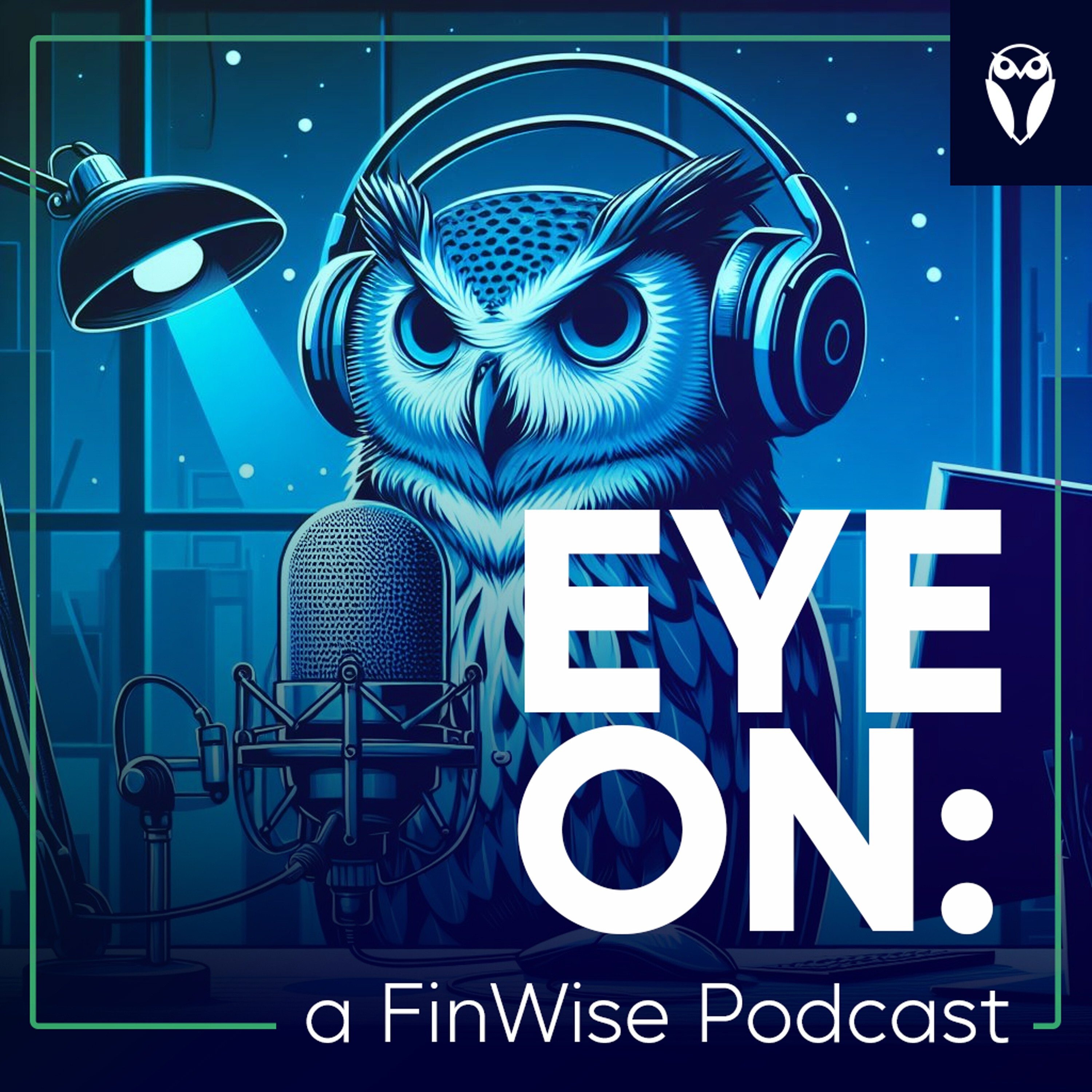Episodes
Episodes
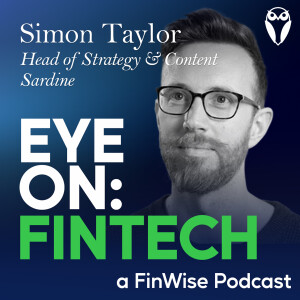


7 days ago
7 days ago
Summary
In this episode of the FinWise EYE ON: podcast, Simon Darchis and Simon Taylor delve into the evolving landscape of stablecoins, exploring their definition, mechanisms, and implications for traditional financial institutions. They discuss the importance of trust and reserve management, the challenges of market fragmentation, and the potential for stablecoins to coexist with central bank digital currencies. The conversation also touches on regulatory considerations, the future of payments, and the impact of stablecoins on traditional banking, highlighting the need for innovation and adaptation in the financial sector.
Takeaways
Stablecoins are designed to reduce volatility in cryptocurrency markets.
They are pegged to stable assets like the US dollar to maintain value.
Trust in stablecoins relies heavily on the issuer's reserve management.
Market fragmentation poses challenges for stablecoin interoperability.
Central bank digital currencies may coexist with stablecoins in the future.
Stablecoins are already being used in cross-border transactions.
Regulatory frameworks are evolving to accommodate stablecoins.
Banks must innovate to retain deposits in the face of stablecoin competition.
The rise of stablecoins could lead to a shift in traditional banking practices.
Shadow banking risks may increase with the growth of stablecoins.
Global Digital Finance
Sardine
FinWise Bank
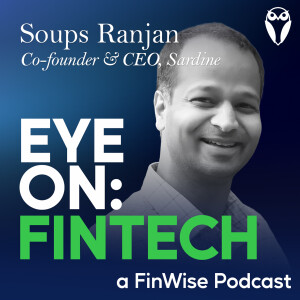


Wednesday Jun 25, 2025
Wednesday Jun 25, 2025
Summary
In this episode of the EYE ON: Fintech podcast, Kenzie Mexican speaks with Soups Ranjan, co-founder and CEO of Sardine AI, about the evolving landscape of fraud prevention in the financial services sector. They discuss the impact of AI on fraud tactics, the importance of behavioral biometrics, and how Sardine is addressing challenges like authorized push payment scams and synthetic identities. Soups shares insights on leadership in fraud prevention and the future of AI in enhancing compliance and risk management.
Takeaways
Soups Ranjan has a PhD in electrical and computer engineering and has spent his career fighting fraud.
Sardine AI focuses on intrinsic behavior biometric features for identity verification.
AI is being used to streamline compliance and fraud operations, significantly reducing manual workloads.
Behavioral biometrics can detect anomalies in user behavior that indicate fraud.
Transparency in AI models builds trust with operations teams.
AI can help financial institutions increase their speed to revenue by automating processes.
Sardine's approach combines machine learning with rules-based systems for effective fraud detection.
The use of behavioral data does not involve personally identifiable information (PII).
Sardine's tools are designed to combat synthetic identities by cross-referencing multiple data points.
Leadership in fraud prevention requires being hands-on and understanding team challenges.
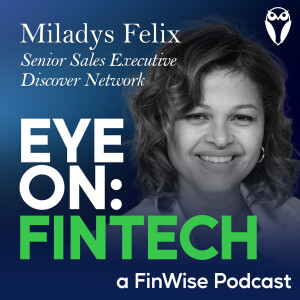


Tuesday May 27, 2025
Unlocking the Secrets of Credit Card Programs - Miladys Felix, Discover Network
Tuesday May 27, 2025
Tuesday May 27, 2025
Summary
In this episode of the FinWise EYE ON: podcast, Sarah Grotta speaks with Miladys Felix from Discover Network about the intricacies of launching a successful credit card program. They discuss Miladys' career journey and the unique position of Discover Network in the global payments landscape. The conversation also covers innovations in payment solutions, the rise of fintechs in the credit card space, and the challenges involved in navigating the credit card value chain. Miladys emphasizes the importance of creating streamlined solutions for partners and the need for creativity in overcoming contractual and operational hurdles.
Takeaways
Miladys Felix shares her journey into the payments industry.
Discover Network operates three brands: Discover, Diners Club, and Pulse.
Discover Network processed around 622 billion in spend value globally in 2024.
Innovations like tap on mobile and faster payments are gaining traction.
Fintechs are driving consumer loyalty through innovative credit card offerings.
Commercial credit cards are becoming essential for businesses to manage expenses.
The credit card value chain involves multiple players and complexities.
Creating a packaged solution can simplify the go-to-market process for partners.
Understanding roles and responsibilities is crucial for successful credit card program implementation.
Army & Air Force Exchange Service to Collaborate with Discover® Global Network to Expand MILITARY STAR Card Acceptance
5 Consumer Payment Trends Shaping How We Pay in 2025
Miladys on Linkedin
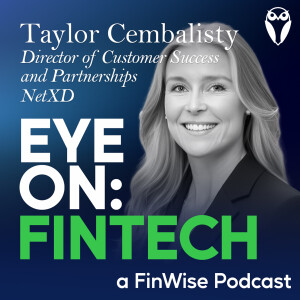


Thursday May 15, 2025
Building a Strong Infrastructure for AI Adoption - Taylor Cembalisty, NetXD
Thursday May 15, 2025
Thursday May 15, 2025
Summary
In this episode of the EYE ON: Podcast, Simon Darchis speaks with Taylor Cembalisty, a leader in customer success and partnerships at NetXD. Taylor shares her journey from the nonprofit sector to financial services, highlighting her experiences at JP Morgan and NARMY. The conversation delves into the role of AI in financial services, particularly focusing on AI agents and their potential to enhance customer interactions.
Taylor discusses the challenges of data management and the importance of infrastructure in implementing AI solutions effectively. The episode concludes with insights on the future of AI in banking and the need for financial institutions to adapt to new technologies.
Taylor and Simon discuss the integration of AI in financial institutions, exploring its potential use cases, benefits, and challenges. They emphasize the importance of developing internal AI policies, understanding customer needs, and navigating regulatory landscapes. The discussion highlights how AI can enhance both customer experiences and back-office operations, ultimately driving innovation in the financial sector.
Takeaways
Taylor's journey from nonprofit to financial services is unique.
AI is revolutionizing customer interactions in banking.
The concept of AI agents is gaining traction in fintech.
Data challenges remain a significant barrier to AI adoption.
Infrastructure is crucial for leveraging AI technologies.
Customer success teams are essential in fintech.
AI can automate back-office processes effectively.
The future of banking will involve more autonomous AI actions.
Financial institutions must adapt to stay competitive.
Understanding legacy systems is key to implementing AI. Financial institutions should start with an internal AI policy.
AI can improve both customer-facing and back-office operations.
Understanding AI is crucial for financial institutions to stay competitive.
AI can automate mundane tasks, freeing up time for more valuable work.
Customer interactions can be enhanced through AI-driven insights.
Regulatory clarity is needed for AI adoption in finance.
AI can help in financial literacy and customer education.
A top-down and bottom-up approach is essential for AI adoption.
AI can facilitate quicker decision-making and operational efficiency.
Organizations should prepare for AI by educating themselves and exploring use cases.
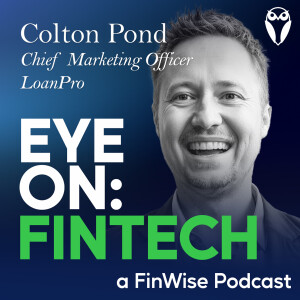


Tuesday Apr 22, 2025
Tuesday Apr 22, 2025
In this episode of the FinWise EYE ON: Fintech podcast, host Nick Chiappetti speaks with Colton Pond, Chief Marketing Officer at LoanPro, about the evolving landscape of fintech, the importance of modern infrastructure, and innovative features like transaction level credit. They discuss the challenges of compliance, the future of credit cards, and the competitive dynamics between fintechs and traditional banks.
Colton also shares insights on marketing strategies in fintech and introduces his new venture, Fintech NerdCon, aimed at fostering meaningful connections within the industry.
The conversation concludes with an optimistic outlook for the future of fintech, emphasizing the demand for better financial products.
Takeaways
Colton Pond is passionate about fintech and aims to stay in the industry forever.
Loan Pro is a leader in lending and credit infrastructure, serving a diverse range of clients.
Modern infrastructure is crucial for fintechs to remain competitive in the evolving market.
Transaction Level Credit is an innovative feature that allows for personalized financial products.
Compliance challenges are significant, and Loan Pro has developed guardrails to help navigate them.
Younger consumers are increasingly interested in credit cards as they enter the workforce.
Fintechs are currently competing more with each other than with traditional banks.
LoanPro aims to simplify the credit card launch process for fintechs and banks.
Fintech NerdCon is a new initiative focused on curated content and meaningful interactions in the fintech space.
The future of finance is optimistic, with a strong demand for better financial products.
https://www.fintechnerdcon.com/



Tuesday Apr 08, 2025
Banking on the Future: Conversations from FinTech Meetup 2025
Tuesday Apr 08, 2025
Tuesday Apr 08, 2025
Insights and Innovations from the Frontlines of FinTech
In this special edition of the FinWise EYE ON: podcast, host Nathan Mills, Vice President of Corporate Marketing and Communications at FinWise Bank, takes listeners to the FinTech Meetup event in Las Vegas. The episode features a 'banker on the street' format, where Nathan engages with ten banking professionals from diverse backgrounds.
Topics covered include fintech regulation, the role of sponsor banks, compliance, the future of AI in banking, and operational challenges. Through interviews with leaders banking leaders, the episode offers a comprehensive view into the current state and future prospects of the Fintech and sponsor bank industry. Insights from industry insiders highlight the necessity of regulatory compliance, the impact of technological innovations, and the value of collaboration among banks. The episode promises to deliver thought-provoking perspectives and firsthand industry experiences.
Sean Farnsworth - VP, Sales and Diligence, TAB Bank
Karen Schmidt - VP, Business & Product Development, Sutton Payments
Devon Secoy - Fintech Operations Director, Focus Bank
Joe Morgan - SVP, Head of Strategic Partnerships, Continental Bank
Matt Cowan - General Manager, Cambr Brand/NBH Bank
Maria Wilkison - Director of Fintech Credit, Sunrise Banks
Matt Michaelis - CEO, Emprise Bank
Blake Tidwell - COO Payments, Thread Bank
Miles McClure - CEO, Rocky Mountain Bank and Trust
Steven Avila - Product Strategy & Go-to-Market Manager, Sunwest Bank



Monday Mar 24, 2025
Monday Mar 24, 2025
In this episode of the FinWise EYE ON: podcast, Sarah Grotta speaks with Phil Goldfeder, CEO of the American FinTech Council, about the evolving landscape of financial technology and regulation. They discuss the AFC's mission, the impact of recent political changes on the regulatory environment, and the future of crypto and stablecoin regulations.
Phil emphasizes the importance of proactive engagement with regulators and the need for a collaborative approach to create a stable financial services ecosystem. He discusses the evolving landscape of FinTech regulation, highlighting bipartisan efforts to create fairer financial services and emphasizes the importance of responsible innovation and the role of states in shaping regulations.
The conversation also touches on the future of the CFPB, legislative proposals regarding interest rates and credit card networks, and the significance of data privacy in the context of open banking. Goldfeder concludes by promoting the upcoming American FinTech Policy Summit, which aims to foster dialogue among industry leaders and regulators.
Takeaways
The American FinTech Council has evolved significantly since its inception.
AFC aims to educate and influence policymakers on financial regulations.
Regulatory changes are often influenced by political shifts and elections.
Proactive compliance and risk management are essential for financial services.
The current administration is more open to collaboration with the fintech industry.
Stablecoin and crypto regulations are on the horizon.
The AFC represents a diverse range of fintech companies and innovative banks.
Regulators should not dictate industry practices but work collaboratively with it.
The importance of defining one's narrative in the financial services space.
The Fair Exams Act aims to improve regulatory oversight and efficiency. Bipartisan efforts in FinTech regulation are gaining momentum.
FinTech is crucial for serving millions of consumers today.
Consumers are accessing financial services differently than before.
State regulations may become more aggressive in response to federal deregulation.
The CFPB is not going away but may be restructured.
Interest rate caps on credit cards face significant opposition.
The alternative network for credit cards may not gain traction.
Data privacy rules are still evolving and may see changes.
Open banking presents opportunities for consumer competition.
The American FinTech Council conference will focus on thoughtful leadership in the industry.
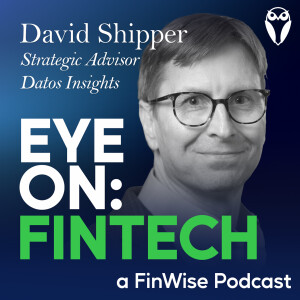


Monday Mar 17, 2025
Card Trends Unveiled: Insights with David Shipper of Datos Insights
Monday Mar 17, 2025
Monday Mar 17, 2025
Summary
In this episode of the FinWise EYE ON: podcast, Sarah Grotta speaks with David Shipper, a strategic advisor at Datos Insights, about the latest trends in payment cards. They discuss the profitability of debit cards, the impact of regulations, and the evolving credit card market. David shares insights on how smaller banks can successfully issue their own credit cards and the potential of flexible credentials that link multiple payment types. The conversation also touches on the future of physical cards and consumer spending trends in the current economic climate, concluding with information about an upcoming conference focused on retail banking transformation.
Takeaways
David Shipper provides insights on the payment card industry.
Debit cards remain profitable despite regulatory challenges.
Banks can increase debit card transactions through strategic practices.
Smaller banks have opportunities to issue their own credit cards.
Flexible credentials could streamline payment processes for consumers.
Physical cards still hold significant value in consumer wallets.
Consumer spending trends are influenced by economic factors.
The potential impact of credit card interest rate caps is concerning.
Conferences provide valuable networking opportunities for bankers.
The importance of adapting to changing consumer preferences in banking.
Keywords:
payment cards, debit card trends, credit card market, financial institutions, consumer spending, banking technology, flexible credentials, economic insights, retail banking, card issuing
